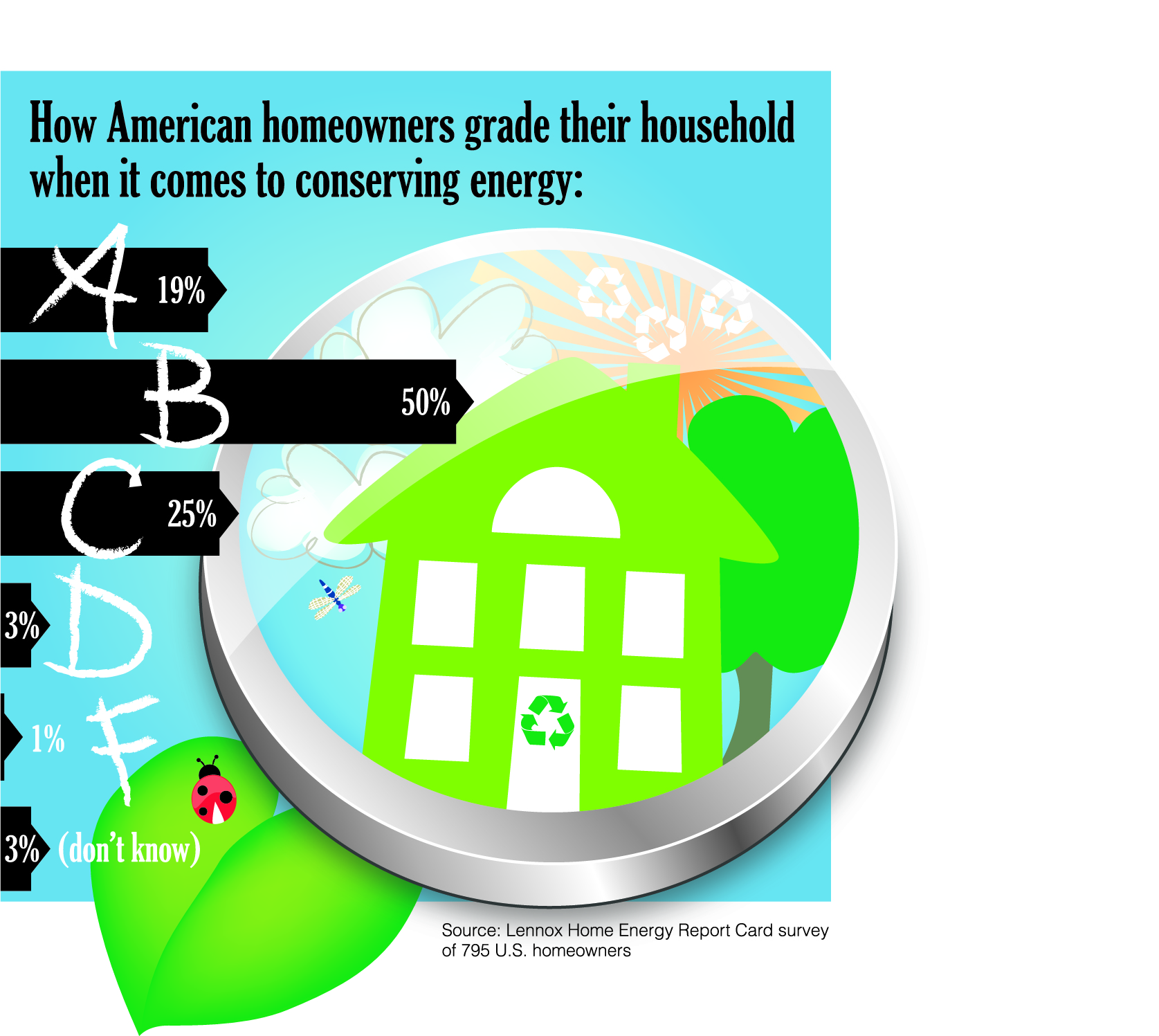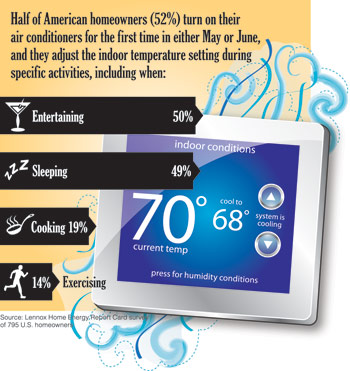Richardson, TX (June 2011) — With temperatures and electric bills on the rise this summer, many American homeowners are taking proactive steps to conserve energy — some going so far as to hang out in their undergarments at home instead of turning on the air conditioning. However, most realize they have a long way to go to make it to the head of the class when it comes to increasing their energy efficiency.

The Lennox Home Energy Report Card survey, conducted by GfK Roper, found six in 10 homeowners (64 percent) are conserving energy — from swapping out incandescent light bulbs with compact fluorescent light bulbs (CFLs) to programming a thermostat to better regulate air conditioner usage — because they want to save money.
While most are willing to invest in energy-saving measures that will yield long-term savings, others take a "breezier" approach to energy conservation. The survey finds that 35 percent of homeowners would rather walk around in their undergarments at home rather than spend money to cool off the house this summer, with men being more likely to hang out in their undergarments (43 percent) than women (29 percent).
"With demand for electricity rising, right along with energy costs, a typical homeowner can easily spend hundreds of dollars a month on summer utility bills, which for some can be almost the equivalent of a house payment," says Brandon Chase, an energy efficiency expert and product development manager at Lennox — a leading manufacturer of home heating and cooling equipment. "More than half of a home's energy costs comes from heating and cooling. Fortunately, there are ways to control those costs and keep cool this summer — and they don't involve removing your clothes." While replacing an old air conditioner with a new, energy-efficient system can have one of the biggest impacts on your summer utility bills, Chase says homeowners can make other improvements to cut home cooling costs and conserve energy, such as installing insulation, adding weather-stripping to doors and windows, and installing a programmable thermostat.
Avoiding a Summer Blackout: Most Would Rather Stay Cool Than Connected to Conserve Energy

During the summer months, demand for electricity increases as homeowners crank up the A/C and power outages can sometimes occur. In the event the energy grid becomes strained this summer and energy conservation is requested by utility companies, the Lennox survey finds homeowners are more likely to turn off their TV (29 percent) and computer (23 percent) for a period lasting two weeks or more rather than shut off the air conditioner (18 percent).
Fewer are willing to give up "necessities" like their washer and dryer (15 percent) and indoor lights (8 percent) in the event the power grid becomes strained. And hot water and cold food are considered essential: few would turn off their water heater (5 percent) or refrigerator (1 percent) for two weeks or more.
What People Do Versus What They Know to be True: Taking Baby Steps on Path to Energy Conservation
While 63 percent correctly believe replacing an old, inefficient air conditioner with a new, efficient model saves a lot of energy, the survey finds only about half (51 percent) of homeowners have taken this step. Similarly, 52 percent of homeowners think using solar energy to power appliances like water heaters and air conditioners can help conserve a lot of energy, but only about one in five (21 percent) have installed solar panels or solar-powered appliances.
Homeowners were more likely to change air filters in a heating and cooling system on a regular basis (82 percent), replace traditional incandescent light bulbs with CFLs (79 percent), and turn down the temperature setting on a hot water heater (60 percent), despite the fact most homeowners think these activities only save some energy.
A/C Deprivation During Summer Vacation May Lead to Energy Bill Frustration
More than half of homeowners (51 percent) turn off the A/C completely when leaving their home for summer vacation or an extended period of time, but Chase warns that can be an energy waster if you live in a warm climate. He says it can often take a lot of time and more electricity to cool down a house once you return from a long trip than it takes to maintain a slightly higher-than-normal temperature using a programmable thermostat.
Four in 10 surveyed (42 percent) get it right by turning the thermostat up so the air conditioner doesn't come on unless it's extremely hot, and six percent say they don't adjust the thermostat when they're gone — but they too could be wasting energy if they're gone for more than a few days.
Spending to Save: Investing in Energy-Reducing Upgrades an Option to Help Make the Grade
The majority of American homeowners (96 percent) are willing to spend money — even in today's economy — on home energy improvements.
While mostly inexpensive items, such as CFLs (78 percent) and programmable thermostats (72 percent), are among the top three items homeowners are willing to spend money on in order to save energy, it's the more expensive undertaking of adding insulation that tops the list, with 81 percent saying they're willing to spend money on insulation to save energy. Installing high-efficiency water heaters (71 percent), more efficient windows (70 percent) and high-efficiency air conditioners and furnaces (69 percent) also are options considered money well spent by homeowners.
A Chance to Move to the Head of the Class
"Making home energy improvements are a lot like a good diet and exercise plan; most Americans know what they should do, but they don't always actually put the plan into action," says Chase. "Since the survey finds that only about half of Americans have replaced their aging, inefficient air conditioners, Lennox wants to give the rest an opportunity to do the same and improve their score on the Home Energy Report Card."
Between July 1 and August 15, Lennox will give homeowners a chance to win up to $10,000 in energy-efficient Lennox heating and cooling products, along with other "cool" prizes, by submitting their most unusual, unique and innovative tip for saving energy at home at www.Lennox.com/residential
About the Lennox Home Energy Report Card Survey
The results of the Lennox Home Energy Report Card survey are based on a telephone survey that was conducted by GfK Roper on behalf of Lennox Industries among 795 homeowners (ages 18 and over) within the United States between May 6 and 8, 2011. Entire survey results are available upon request by calling Jason Hergenrader at (214) 379-6709.
About Lennox Industries
Lennox Industries is a leading provider of customized home heating, cooling and indoor air quality products that are designed to deliver customized comfort, efficiency and functionality, with the most innovative and reliable features available. The U.S. Environmental Protection Agency and the Department of Energy have selected Lennox as an ENERGY STAR Manufacturer of the Year four times in recent years for its outstanding contribution to developing and promoting energy-efficient products. For more information about Lennox home comfort products, visit Lennox.com or call 1-800-9-LENNOX.
